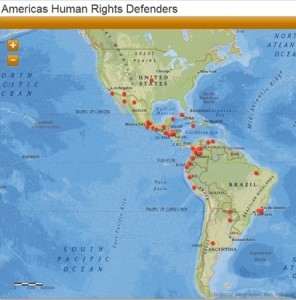
Click to explore some emblematic human rights cases throughout the Americas, many of which have been positively influenced by the Inter-American System. These were taken from Amnesty International’s report “Transforming Pain into Hope: Human Rights Defenders in the Americas” (Photo Credit: Katie Striffolino via ArcGIS).
This Friday, a Special Organization of American States (OAS) General Assembly will meet in Washington, D.C. to consider and adopt a draft resolution regarding strengthening the work of the Inter-American Commission on Human Rights (IACHR). While not many would argue the IACHR is perfect, its integrity and core principles are under attack at the very moment the system is needed most by so many throughout our hemisphere.
On September 22, 2012, Honduran human rights lawyer Antonio Trejo Cabrera was killed. Gunmen shot him five times outside a wedding ceremony in a southern suburb of the capital, Tegucigalpa. Antonio Trejo Cabrera had reported receiving death threats linked to his work representing the victims of human rights abuses amidst the ongoing land conflict in the Bajo Aguán region of Honduras. Antonio Trejo Cabrera had been a lawyer for three peasant cooperatives embroiled in the complex land-rights dispute in Bajo Aguán. He had helped campesino communities to regain legal rights to land in the valley and was due to travel to Washington, D.C. in October 2012 to take part in hearings at the Inter-American Commission on Human Rights.